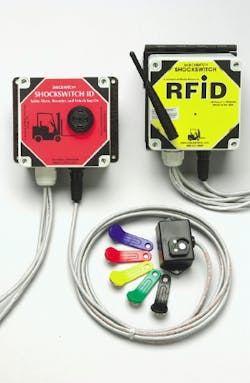Laser Scanners for Obstacle Avoidance (sidebar)
In a basement area of Libbey Inc.’s Shreveport, La., glassware plant, operators on front-end loading vehicles constantly load cullet, or waste glass material, from the plant’s production process, and carry it outside for recycling. “It’s molten glass, somewhere around 2,000 degrees. It drops into concrete bins and we go in and scoop it up and get it out of the basement,” explains Randy Davis, maintenance planning engineer at the plant.
For years, Libbey had experienced costly problems with continuing damage to the front-end loaders, due to collisions that the company suspected could have been avoided by the operators in the minimally supervised area. “They were tearing chunks out of tires, bending hydraulic cylinders, breaking axles and tearing the front ends out from under the vehicles,” says Davis. “It was costing us a fortune.”
Charged with alleviating the problem, Davis turned to a system called Shockswitch RFID, a vehicle monitoring system supplied by Dallas-based Shockwatch. With the Shockswitch RFID system, operators are assigned electronic “keys” known as iButtons that they must insert into readers on vehicles before they are able to start and operate the machines. The system then records and stores the time, date and the operator identity when impacts occur that exceed the adjustable threshold limit of a mechanical impact sensor mounted on each machine. That data is transmitted via wireless network to a base station computer for viewing and report generation by managers using the associated ShockMate RF software.
At the Libbey plant, the installation of the Shockswitch RFID system produced the desired results. The system provided proof that certain suspected operators were indeed involved in more than their share of impact incidents, says Davis. “No one has lost their job over it, but we have had some counseling about it,” he notes. “It definitely changed their habits.”
Vehicle damage has consequently dropped significantly, and the savings have been dramatic. Libbey’s repair costs on the plant’s four basement front loaders during the six months prior to the Shockswitch RFID installation totaled nearly $27,000, including parts and labor, Davis says. During the six months following the installation, repair costs were reduced to just under $11,000, he notes. About $6,200 was spent to purchase and set up the Shockswitch RFID system, Davis adds.
Less Damage
At Shockwatch, Product Manager Eddie Clay says those results are not atypical. Customers report anywhere from 50 percent to 85 percent reductions in damage-related costs following Shockswitch RFID installations, Clay says. “And they’ll tell you anywhere from three months to a year for return-on-investment,” he adds.
The Shockswitch system provides various programming options, such as sounding the vehicle horn for a specific time after a recordable impact occurs, or latching the horn on continuously until a supervisor resets the system. The system can also be set up to shut down a machine when it sustains a hit, following a user-programmable delay. For safety and liability reasons, however, vehicles in shutdown mode can always be moved by the operator in 20-second increments, notes Clay.
Besides monitoring impacts, the Shockswitch RFID system can also aid managers in complying with Occupational Safety and Health Administration (OSHA) requirements concerning driver certification for forklifts trucks and other manned vehicles. Log-on access for operators can be limited to vehicles for which operators are certified, and the system software can track certification expiration dates. Further, the Shockswitch system can track hours of operation for each vehicle, and can be programmed to sound an alert when maintenance operations are due.
Given the Shockswitch system’s effectiveness with the front loaders, says Davis, a Shockswitch impact detection unit is now being attached to every new vehicle acquired by the Libbey plant, including forklift trucks, sweepers and other vehicles.
See the story that goes with this sidebar: Laser Scanners for Obstacle Avoidance

